Daredevil: Season Three Was An Incredible Ending To An Incredible Show
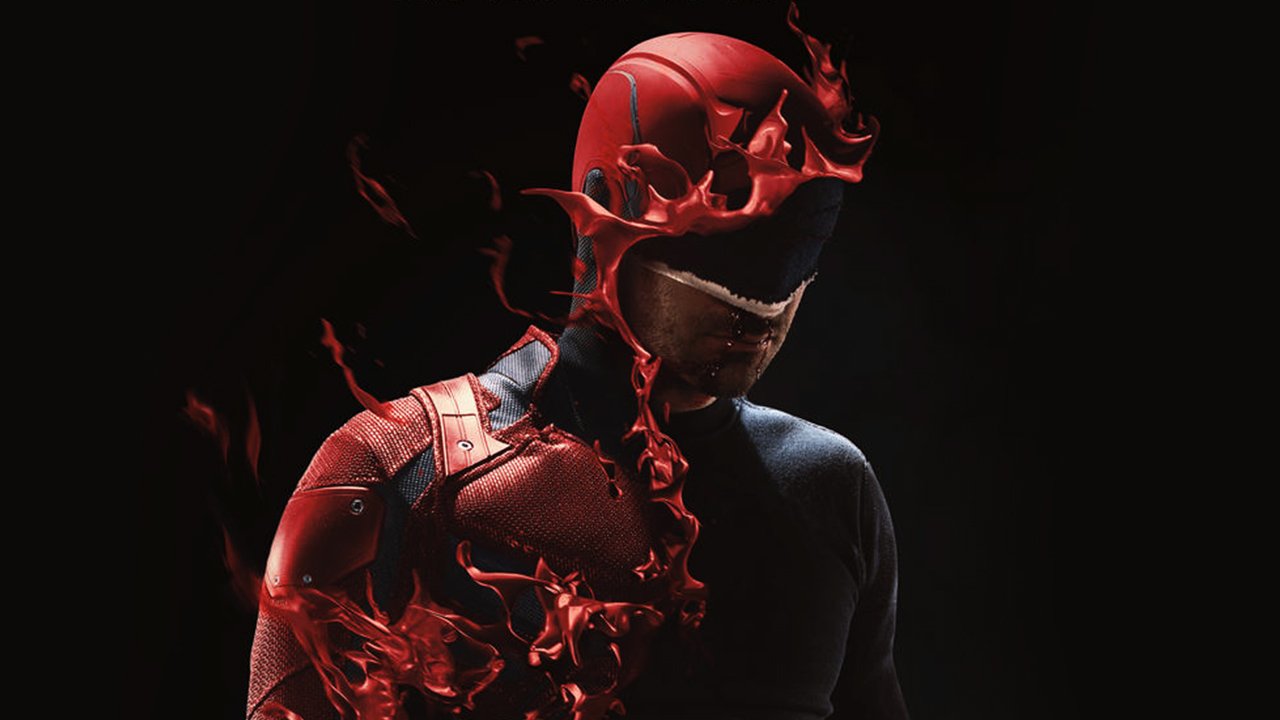
Since Daredevil premiered on Netflix in 2015, the show has been one of several properties that has changed the way super heroes and comic book characters are being portrayed in film and television. As the first of several Marvel shows created in association with the game changing streaming service, Daredevil created an exceptional and distinct series. Daredevil is a super hero show that succeeded in being mature, violent, and morally nuanced. The focus on a street level vigilante, a vulnerable and human protagonist, grounded the show in a recognizable and familiar New York City.
In 2018, after two well regarded seasons (with Season Two suffering from a split focus between the mystical and criminal elements) and the team up Defenders miniseries, Daredevil‘s third season debuted to wide spread acclaim. Season 3, partially based on the acclaimed Daredevil: Born Again graphic novel by Frank Miller (the writer credited with redefining the man without fear), explores the essence of the character, expanding the character’s depth to even greater proportions. The final season of Daredevil pushes Matt Murdock and all of the other major characters to their emotional limits and in doing so reveals their respective flaws and humanity. The season acts as a complex examination of universal questions like guilt, grief, pain, and justice, which are expressed and explored through the actions of each character, with authentic consequences attached to each character’s actions.
Daredevil Season Three is the finest season of any super hero show to date and the pinnacle of all of Marvel’s work with Netflix. The show’s final season stands as a fitting ending point for the Man Without Fear’s acclaimed television rebirth. With the announcement of Daredevil‘s cancellation, it is time to look back at Daredevil‘s final season and examine the emotional and moral nuance that makes Season 3 one of the most sophisticated stories within the genre.
Part I – Challenging The Essence of the Character
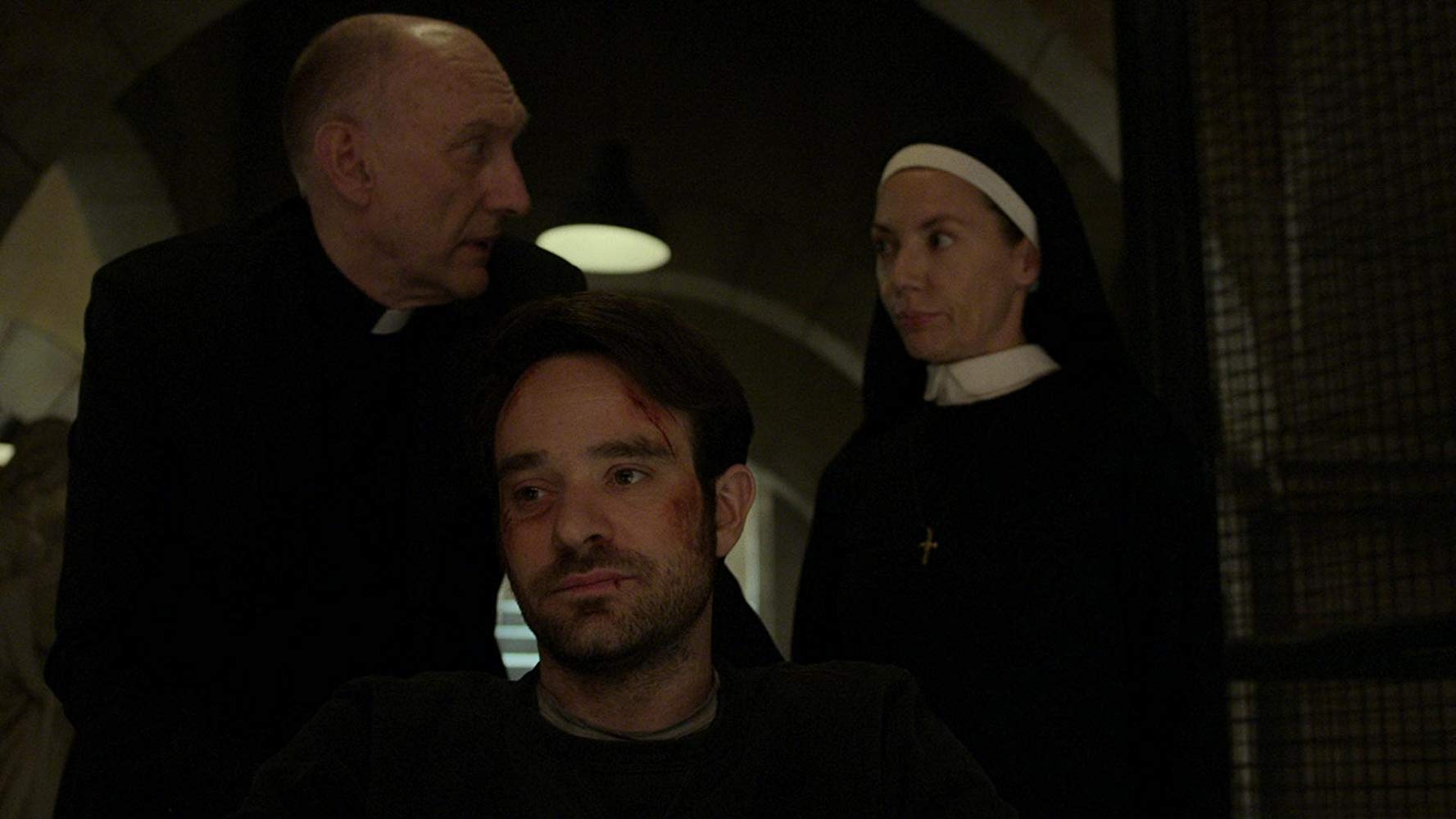
Matt Murdock’s Catholicism has been a key feature of the series since its first episode. The excellent title sequence, which sets the stage for the show, contains imagery of blood, church and angels. The imagery within the sequence are clear illusions to the deep and nuanced Christian symbolism and iconography that have become an integral part of the architecture and identity of New York City’s architecture. This sequence, seen in each episode of Daredevil, emphasizes the importance of Catholicism and religion to Matt and the show’s identity.
Within the show, the confessional conversations between Matt and Father Lantom are examples of how Matt’s Catholicism is thematically important to the show. These intimate conversations are critical moments of self examination within the series, adding to our understanding of Matt, as well as the complex moral questions that Matt faces as Daredevil. Father Lantom’s role as a confidant, as well as the confessional conversations, reinforce the important of Catholicism in Matt’s identity. While Matt may have a difficult relationship with God and his own faith, the show has repeatedly illustrated that his spiritual and moral journey is an important element of the show across all seasons.
Despite Matt’s shaky relationship with the Catholic Church and God, Murdock’s moral philosophies have clearly been influenced by his upbringing. Matt’s code as Daredevil are rooted in several Catholic tenants including the concept of Grace. Grace refers to the concept within Catholicism that all people, whether criminals or citizens, rich or poor, young or old, deserve “the free and undeserved help that God gives us”. Matt believes every person deserves a chance of reforming and/or redeeming themselves, regardless of their past deeds. This philosophy connects perfectly to his identity as a lawyer, where the concept of rehabilitation and “innocent until proven guilty” encourage Murdock to believe in the human capacity to grow and reform.
Matt’s belief in grace and the possibility for reform are best illustrated in Daredevil’s interactions with Punisher, who symbolizes an opposing moral philosophy. In the Season 2 Episode New York’s Finest, Daredevil and Punisher engage in a ferocious argument over the morality of killing, in which Matt clearly illustrates his belief in Grace. Daredevil refuses to accept Punisher pessimistic viewpoint, arguing that the people Punisher kills still have “one small piece of goodness” left in them. For Matt, killing these people destroys the “one tiny flicker of light” which is now “snuffed out forever.” This is a clear illustrate the concept of Grace, a concept that fundamentally shapes Matt’s identity as both a lawyer and a vigilante.
Building Off A Rich Strong Emotional Foundation
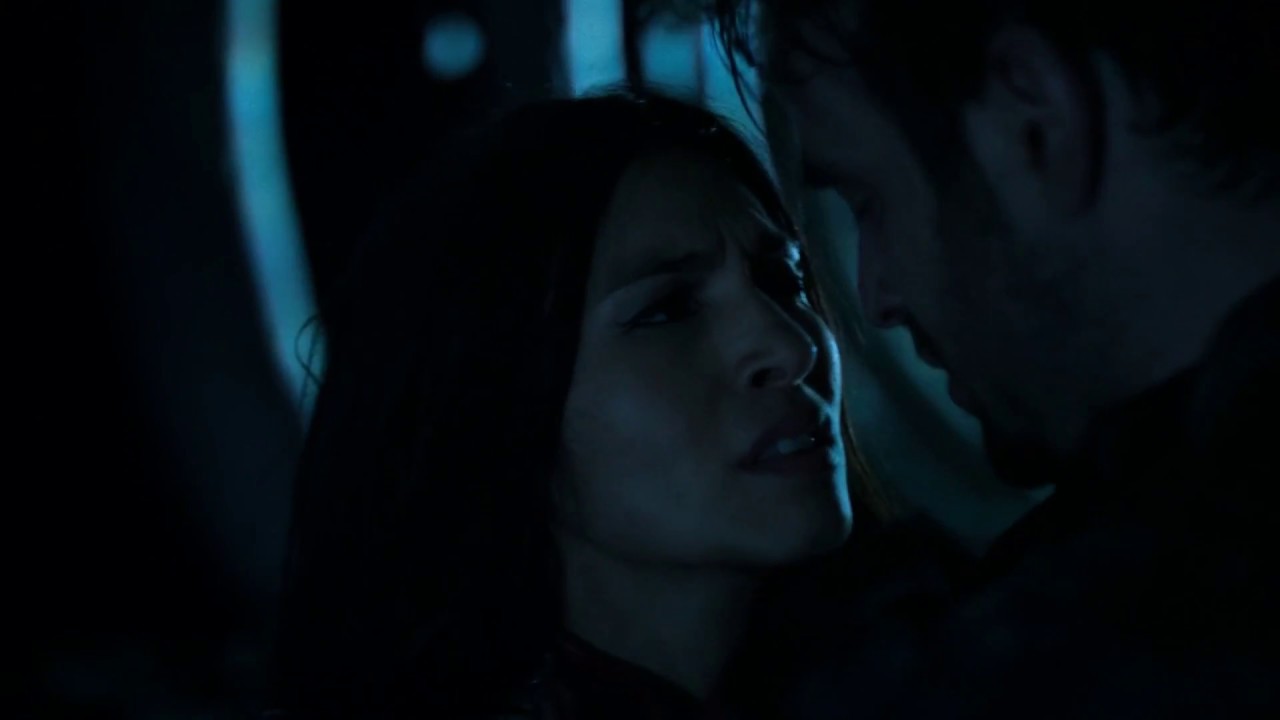
Season 3 of Daredevil brilliantly builds off of the events in Daredevil Season 2 and The Defenders, in which Matt willingly stays behind in a collapsing tunnel with Electra. Matt, who loves Electra, refuses to abandon her after already losing Electra once. Matt survives, though Electra is presumed to be permanently dead, and is taken to Saint Agnes Orphanage. Here, the gravely injured Matt is nursed back to health in the same place he stayed as an orphan after his father’s death. While he is recovering, Matt received visits from Sister Maggie and Father Lantom, two characters who will play key role in the season as confidants and challengers to Matt’s viewpoint. The results of Matt’s injuries and the loss of Electra are crises of faith and identity that will form the thematic core of Daredevil Season 3. Broken and beaten, Matt is consumed by his guilt, grief, and his anger at God.
The common religious backgrounds of Lantom, Sister Maggie, and Matt allow for the use of key biblical allusions, the most significant and important being Job, known from his eponymous old testament book. Within Season 3, Matt compares himself to biblical figure Job, a character that is also used to describe or explain Frank Miller’s Daredevil: Born Again. In the Bible, Job is a servant of God who suffered terrible anguish for his steadfast belief in God. Many view Job as a pawn in an elaborate philosophical debate between God and the Devil, with the later claiming that Job is only pious and loyal to God because he has a prosperous and happy life. To prove the Devil wrong, God rains hardships down on Job, which result in the death of Job’s wife and children, among other calamities.
Matt notes the parallels between his own situation and the biblical Job, saying that he “suffered willingly” and he gave his “sweat and blood and skin without complaint”. Matt closes his speech by asserting that he too believed he was “God’s soldier”. Rather than abandon his belief in God’s existence, Matt comes to the conclusion that God is uncaring and unfeeling. God watches Matt’s pain and grief from a far, rewarding Matt’s steadfast commitment to justice, mercy, and grace with even more pain. The depth of Matt’s emotion pain sets the stage for season 3 central conflicts, with Matt questioning everything he previous believed in, along with the relationships he once attempted to foster with those around him.
What Happens When The Law Fails?
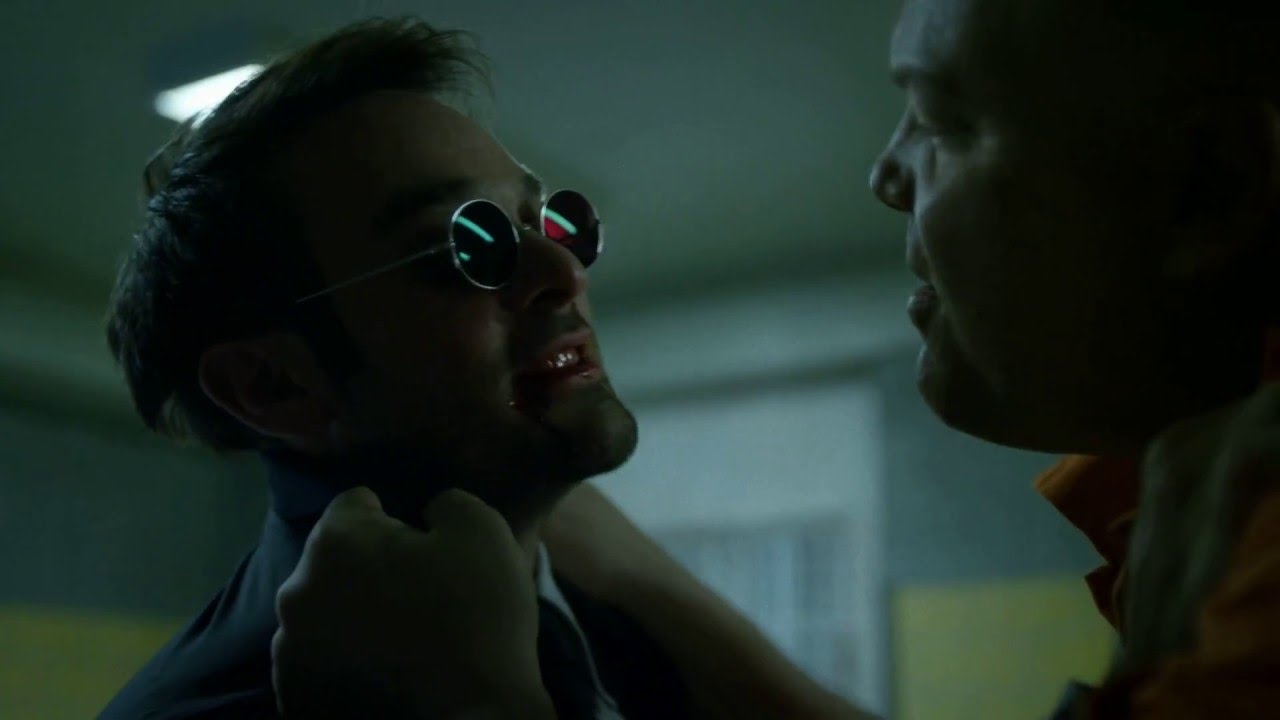
Matt’s crisis of faith progresses further when Fisk is released from prison. The events of Season 1, in which Nelson and Murdock were able to use the law to defeat Wilson Fisk, seemed to deepen Matt’s faith in the law. This event taught Matt that the law could be used effectively to protect the innocent and prosecute the guilty. This faith is challenged when Wilson Fisk manipulates the authorities and uses the law to his own ends. As the Kingpin continues his manipulation, along with punishment of his enemies, new and old, Matt struggles internally with the faith he placed in the law. Matt’s effort as both a lawyer and vigilante have come crashing down, with the evil he thought he had defeated rising to even great power. Matt believe that he used the law to effectively put Fisk away, but Fisk uses the same system to gain his own release.
Ultimately, Matt comes to the conclusion that the only way to stop Fisk is to kill him. Fisk’s brilliant manipulation of the law seems to illustrate that Matt must go outside the conventional methods of justice to defeat Fisk. It’s a decision that would break the code that Matt has lived by. In the past Matt has staunchly allowed opportunities for mercy and the possibility, however unlikely, for the reform of criminals. Killing Fisk would require Murdock to pass “final judgment” on a Fisk, a concept that Matt has previously reserved for God alone. With the internal conflict established, Season 3 becomes elaborate and nuanced morality tale; a battle between the forces within Matt Murdock. In this conflict, Matt’s friends, enemies, and even strangers will push and pull him towards different decisions. Ultimately, this conflict can resolve in only two ways: either Matt will choose to abandon his morality or renew his belief.
Part II – The Ultimate Antagonist – How Kingpin Challenges Matt’s Core Beliefs
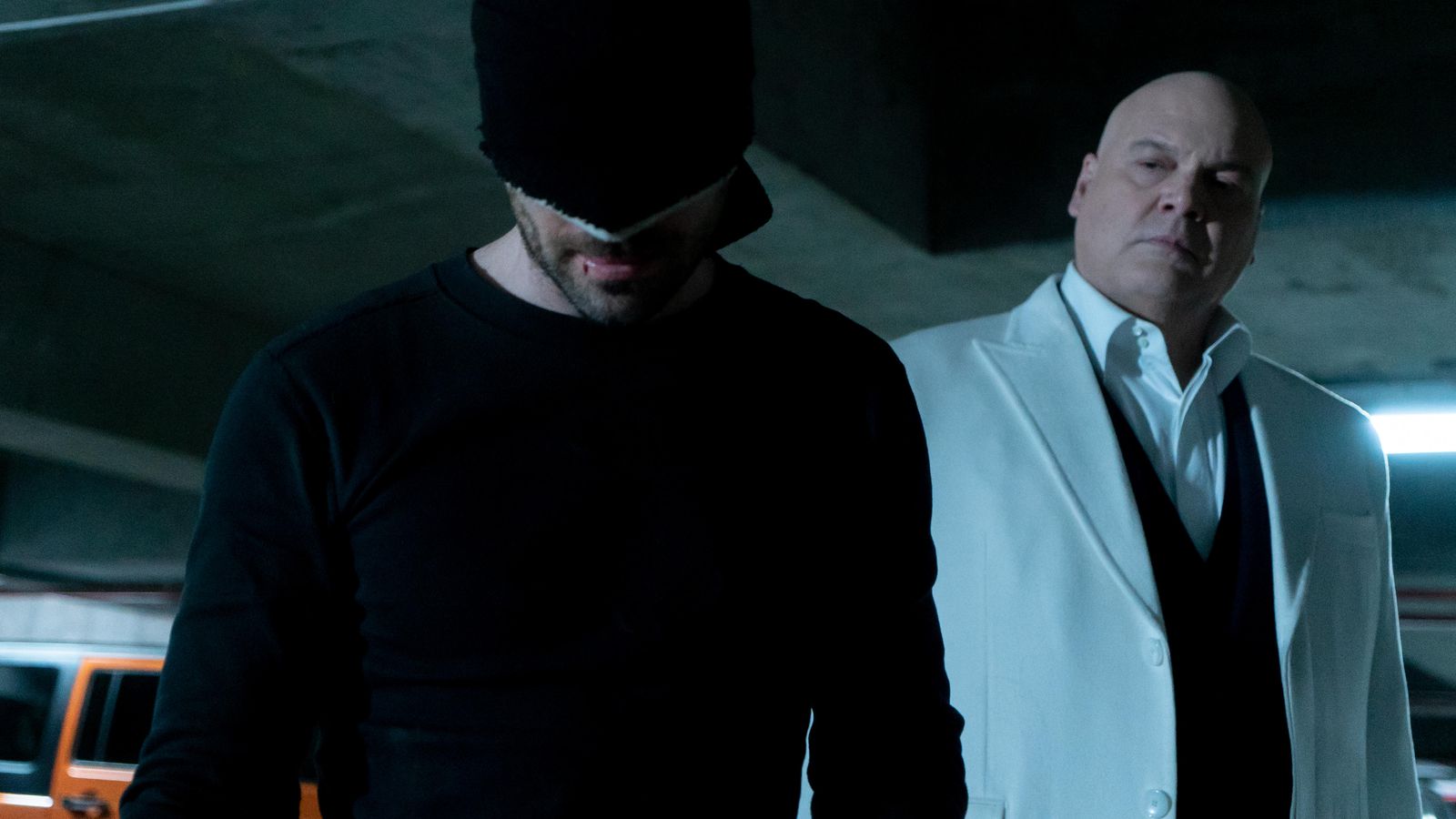
The role of antagonist is to challenge the protagonist, to compete with the protagonist in a significant way. Well written antagonists like Wilson Fisk force protagonists to confront their own inner struggles or to clarify their own beliefs. Vincent D’Onofrio’s Kingpin is the rare villain to present a physical, mental, and moral challenge to Daredevil, a combination that is rarely seen within film and television. The characters share enough beliefs that they can be compared and analyzed against each other. Both characters believe that their actions (within and outside of the law) will make the city a better place. Both character use the law to their advantage to further their crusades. While Matt uses the law to protect the innocent, prosecute the guilty, and uphold justice, Fisk twists the system to fit his perverse needs. Fisk. Finally, both characters use forms of physical violence and intimidation when they deemed them necessary, with neither above getting their own hands dirty in a fight.
In Season One, Vincent D’Onofrio stole the show with a stunning performance that captured the attention of critics and fans alike. Playing Wilson Fisk, the Kingpin of Crime, D’Onofrio developed a character who was incredibly human with streaks of vulnerability, ruthlessness, and violent rage. While the character was incarcerated at the end of the season, it seemed inevitable that audiences would see the character again. The Kingpin’s return was confirm with a small but intriguing cameo in Season Two. Kingpin was shown in a brief prison sequence, asserting to the Punisher that when he emerged he wanted to “win the war, not wage it”. This small role in prison set up his season 3 appearance and his evolution into Daredevil’s ultimate antagonist.
Vincent D’Onofrio’s Kingpin was already the most compelling and nuanced villain in the Marvel Universe, regardless of television or film, but season 3 elevates the character to new levels. Playing the long game, Fisk sets himself as the spider at the center of a web, pulling strings to gain unparalleled power. This includes the manipulation of FBI agents and criminal forces which leave the antagonist feeling untouchable. This complexity of Fisk’s schemes are helped by Daredevil‘s thirteen episode counter (3 more than the 10 in Defenders) This extended time allows the show to focus on the character and complex machinations, leaving the audience with the impression of how powerful the Kingpin truly has become.
Despite the strength and power of the villain, the character exudes surprising vulnerability. Much of Fisk’s thoughts in Season Three revolved around the absence of his love Vanessa. While Kingpin engages in various heinous actions, the fears and uncertain about if Vanessa still loves him are a humanizing quality of the character. Once Vanessa arrives, Kingpin grapples with the complex task of reintegrating a loved one into his life, while also sheltering from his barbaric role as the crime boss of New York City. Ultimately, Vanessa pushes him to share his life fully with her, asserting that all people live flawed live and that the point is to find “the person whose broken pieces fit with yours”. This complex, nuanced relationship between Vanessa and Wilson help illustrate the complexities of the character and how the antagonist can be more than just a one dimension villain.
Part III – New Characters Are Given Time to Development Emotionally
While the writers of Daredevil Season 3 honor their returning characters with nuanced and insightful story lines, new characters play a key role in the success of Season 3. The three main additions to Season 3 are Ray Nadeem, Benjamin Poindexter, and Sister Maggie. Each character is given sufficient time to shine in Daredevil’s spotlight, with each character acting as intriguing foils for Matt Murdock. With this in mind, it is critical to examine each of these characters in detail as well as how these characters contribute to the nuance of the show’s themes.
Ray Nadeem – A Good Man Being Tested Beyond His Limits
Daredevil‘s third season includes three crucial new supporting characters, each one distinct from the other. Agent Ray Nadeem, Poindexter, and Sister Maggie each develop through the series, playing key roles in Daredevil’s narrative.
Agent Ray Nadeem is introduced to viewers early in Daredevil Season Three. Nadeem is a family man with a wife and a young son. We soon learn that Ray has a sister who is battling cancer, an event that has put a emotional and financial burden on the Nadeem household. These events help make the struggling Nadeem a sympathetic character. Ray Nadeem continues to grow as the series progresses, transforming from a struggling family man to a successful agent, then to a man trapped in a web lies and violence, and finally to a grief ridden pariah. It’s a tremendous arc, one following an extremely ordinary character, devoid of super powers or enormous wealth, struggling issues that are both ordinary and unimaginable.
Ray Nadeem also serves as reflection of Matt’s own struggles. Much like Matt, Ray Nadeem is a tireless servant of justice. Ray serves in the FBI, working to protect the innocent and bring the guilty to justice. Tragically, Nadeem’s tireless quest for justice has earned him no financial or professional security. Nadeem selflessly helps to care for his sister’s cancer treatment, a choice that leeaves him on the edge of bankruptcy. With a poor financial background, the steadfast and dedicated agent is seen as a target for bribes, which leave his passed over month after month while others are promoted.
Much like Kingpin, Nadeem acts as a foil to Matt. Both are characters profess to be believed in the law and work to serve other. As the show progress, the caring family man is forced to make choices that could have dangerous consequence for his family and how his family views him. At first, the success Nadeem finds from the Fisk case brings him pride and success, but as the case continues to evolve, Nadeem begins to realize the dark implications that lurk just under the surface. Much like Matt, Nadeem finds himself in a complicated moral and ethical labyrinth where concepts of right and wrong feel elusive and unclear. Much like Matt and Job, Ray is being tested in terrible ways, pushed to his emotional and moral breaking points. Nadeem is forced to make difficult if not impossible choice, questioning how much it will cost to do the right thing, and if doing the right thing will even make a difference.
Benjamin Poindexter/Bullseye – Searching For Your North Star
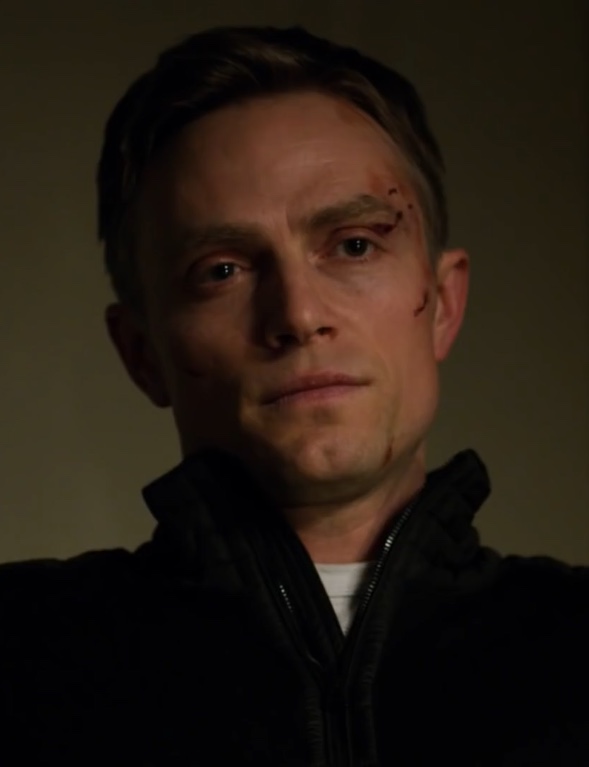 Benjamin Poindexter is another new character who thrives in Daredevil‘s generous spotlight. Introduce as a seemingly inconspicuous FBI agent, it may take fans several episodes to realize that this is the man that will become the villainous Bulleyes. Poindexter’s narrative arc is a complicated and slow burning tragedy with Dex eventually transforming into a ruthless and damaged secondary antagonist for Season Three.
Benjamin Poindexter is another new character who thrives in Daredevil‘s generous spotlight. Introduce as a seemingly inconspicuous FBI agent, it may take fans several episodes to realize that this is the man that will become the villainous Bulleyes. Poindexter’s narrative arc is a complicated and slow burning tragedy with Dex eventually transforming into a ruthless and damaged secondary antagonist for Season Three.
One aspect of the show that is especially impressive is the amount of time spent focusing on the character’s mental health and internal struggles. The show allows the viewer to see the mental illness that plagues Poindexter. The young Poindexter is revealed to lack empathy, even killing his own coach with a baseball. The conversations between Poindexter and his deceased therapist, replayed in brilliant flashbacks, are an unsettling, heartbreaking, and informative. These intimate conversations provide uncomfortable insight into a character struggling with enormous inner demons.
While few would argue that Poindexter’s situation with Julie, a woman he yearns to connect with is without flaw (he is essentially engaged in stalking her), the character’s desperate attempts to connect are heartbreaking. Even years later, Dex is still trying to follow the advice of his therapist, to find a moral compass to guide his actions. In moments of stress, frustration, and confusion, Dex listens to the hundreds of tapes from his therapist, which he uses to compose and calm himself.
The show’s depiction of Dex is also notable because it is not shown as a straight line to evil. Unlike many characters who quickly slip into their darkness, Poindexter does take steps to avoid his darker desires. In his own confused way, Dex seeks out Julie, an individual he believes can help guide him. Tragically, Fisk eliminates what may be Dex’s last lifeline to restraint, making the transformation feel all the more tragic. Fisk pulls apart the structure and safety nets of Dex’s life with cold, calculating efficiency. As this cruel process continues, Dex feels like he has no one to turn to except Fisk. Fisk pushes Dex to embrace and act on his own violence urges, calling his violent efficiency a “gift”. Without Wilson Fisk, Dex would have a chance to live a healthy life in which he received the support that he needs.
The nuance of the characters is key to Bullseye. Yes, the audience is made abundantly clear that Dex is capable of terrible things. In flashbacks it is made clear that as a young man lacked empathy. He murders his baseball coach as a young boy, he throws rocks at kittens (torture of animals is often portrayed in film and television as a key trademark of character’s lacking empathy) and struggles with other violent thoughts and urges. Despite this darkness, we also see Dex seeking way to mitigate his own impulses, first in the FBI, then with Julie’s support. The nuance transformation of Dex from FBI Agent to mass murderer illustrates that great shows surrounds the protagonists with compelling characters to interact with and play off of.
Sister Maggie – Lingering Guilt
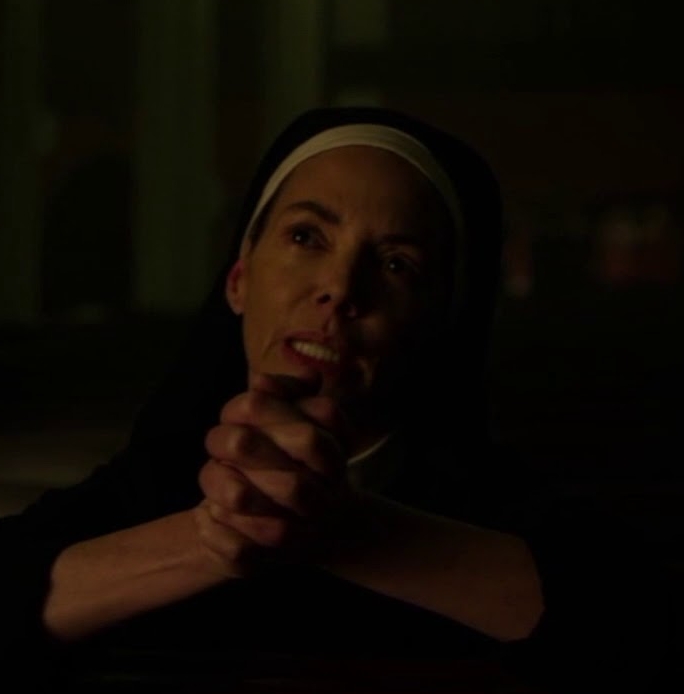
Finally, Sister Maggie (who is revealed to be Matt’s mother) is the third and final new character to truly shine in the series. Sister Maggie doesn’t fit into the stereotype many associate with Catholic Nuns. Maggie is a fierce and stern figure who is gruff and irreverent at times. Maggie’s back and forth verbal barbs with Matt lead to some genuinely humorous moments but more often, these exchanges hint at or illustrate the pain both characters carry inside.
In these conversation Maggie acts as another interesting foil to Matt, illustrating the changes in thinking that can take place over a number of year. Maggie is a character who seems to stand firmly behind her faith, despite her own personal pain and guilt. In comparison, still reeling from his personal tragedies, has refuted his faith. Maggie dealt with post pardon depression after Matt’s birth, which contributed to her decision to not raise Matt herself. Through the years after this difficult time period, Maggie has honed her faith and learn to live with her how guilt and pain, an area where Matt is in desperate need of guidance.
Matt weigh heavily on Maggie’s mind. Much like Matt, she is a character who is defined by past traumas and her own fear. Maggie is terribly afraid to revealed the truth to Matt, afraid to reveal her failure and shame. For much of the season, this fear is a road block to deepening her relationship with Matt, but it is clear that she loves and cares for Matt. If she reveals to truth to Matt, she can better share her experience with him and give him more guidance about how to deal with pain. Ultimately, it takes fate and courage for Maggie to reveal herself to Matt.
The new characters of Daredevil Season Three are important additions to the show. Each one works as a foil to Matt in some ways and helps to illustrate the complex emotional, moral, and ethical issues that the show is examining.
Part IV – Season Three Borrows Thematically From Some Of The Best Comics Ever
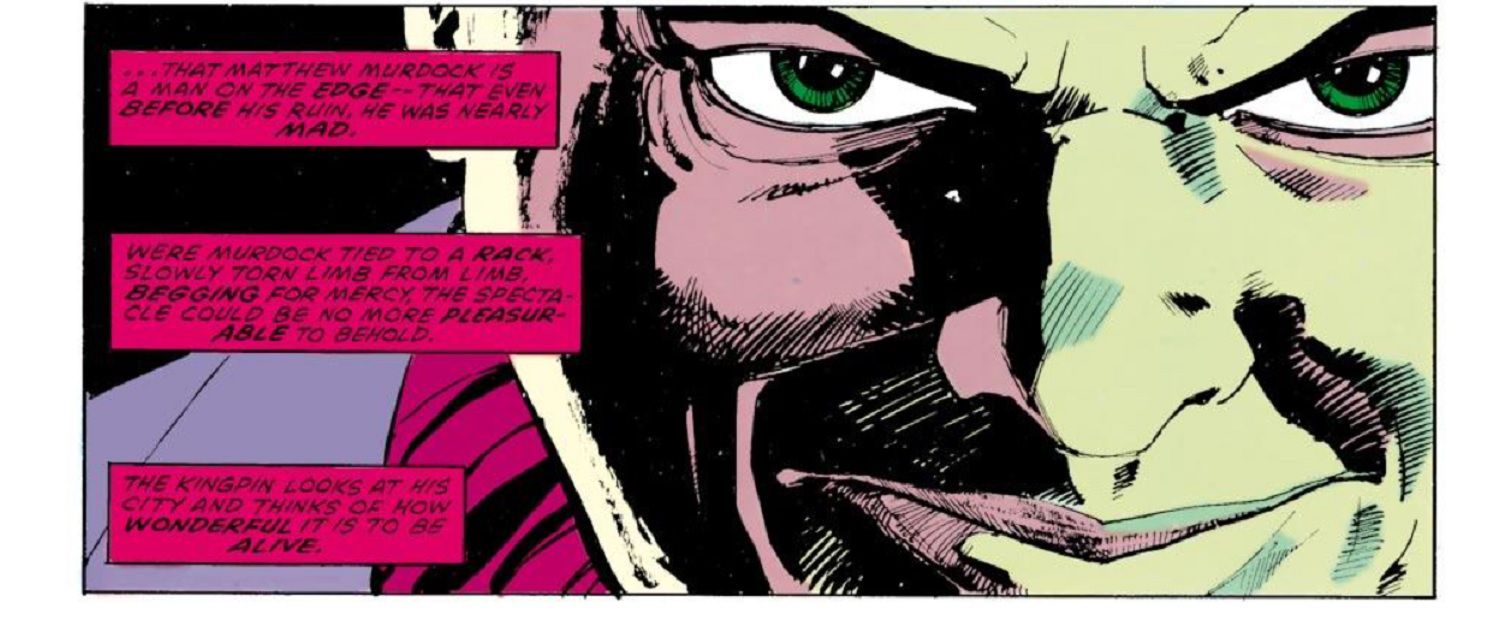
Daredevil Season Three is a thematically rich experience and it expertly draws from the comics for inspiration. Thematically, the season draws deeply from Daredevil: Born Again, a landmark graphic novel by industry legends Frank Miller and David Mazzucchelli, the same team that created the equally acclaimed Batman: Year One. Born Again sees Kingpin discover Daredevil identity and systematically destroy Matt Murdock’s entire life. The book is notable for its use of Christian and Catholic Imagery throughout. Much like the Bible’s Book of Job, Daredevil: Born Again takes a character to his lowest point, devoid of hope. Through this tragedy, it strips down Daredevil to his essence, from which Matt is reborn.
Unlike other comic book adaptions, Daredevil doesn’t seek to stay true to the source material. For example, Born Again‘s Karen Paige is heroine addict who sells out Daredevil’s secret identity. Clearly, this version of the character would not fit within the character established in the previous two seasons. Crucially, the emotions that Matt feels throughout the graphic novel, fear anger, confusion, and grief, are used to expert effect in the show’s third season. Thematically, the show follows in the footsteps of the graphic novel by exploring what happens when Daredevil loses everything and how does he respond to his complex moral and emotional crises.
One aspect of the graphic novel is improved in Daredevil Season Three. In Born Again, Kingpin hires a psychopath to impersonate Daredevil, who sullies the name of the once great vigilante. Daredevil Season Three improves this concept by making Bullseye the man impersonating Daredevil. The show’s writers expand on the simple subplot and transform it into a power confrontation full of key symbolism. Poindexter’, who wears the red devil suit, represents the devastation that a morally bankrupt Daredevil could cause in New York City. The new Daredevil kills mercilessly, twisting the image of a hero into the shroud of a villain. The final fight critically includes both version of Daredevil, with Matt battling that man he could become. Matt even defends Vanessa (Kingpin’s Wife), from his attacks, despite the woman’s culpability in a variety of crimes including the murder of Ray Nadeem. It’s at this moment that Matt seems to realize/understand the need for his moral safeguards. The writers of Daredevil season 3 took this small subplot from Born Again and transformed into a nuanced arc that allows for thrilling set pieces and impactful storytelling .
The outfit that Matt wears in season 3, closely resembling his season one outfit, is lifted straight from Daredevil: The Man Without Fear by Frank Miller (it’s hard to talk about Daredevil comics without mentioning Miller) and John Romita Jr. Matt returns to the costume, trying to recapture the essence of his identity as Daredevil, which represent his first, purest moment as a street level vigilante.
Part V – Daredevil Season 3 Has Intimate and Meaningful Stakes
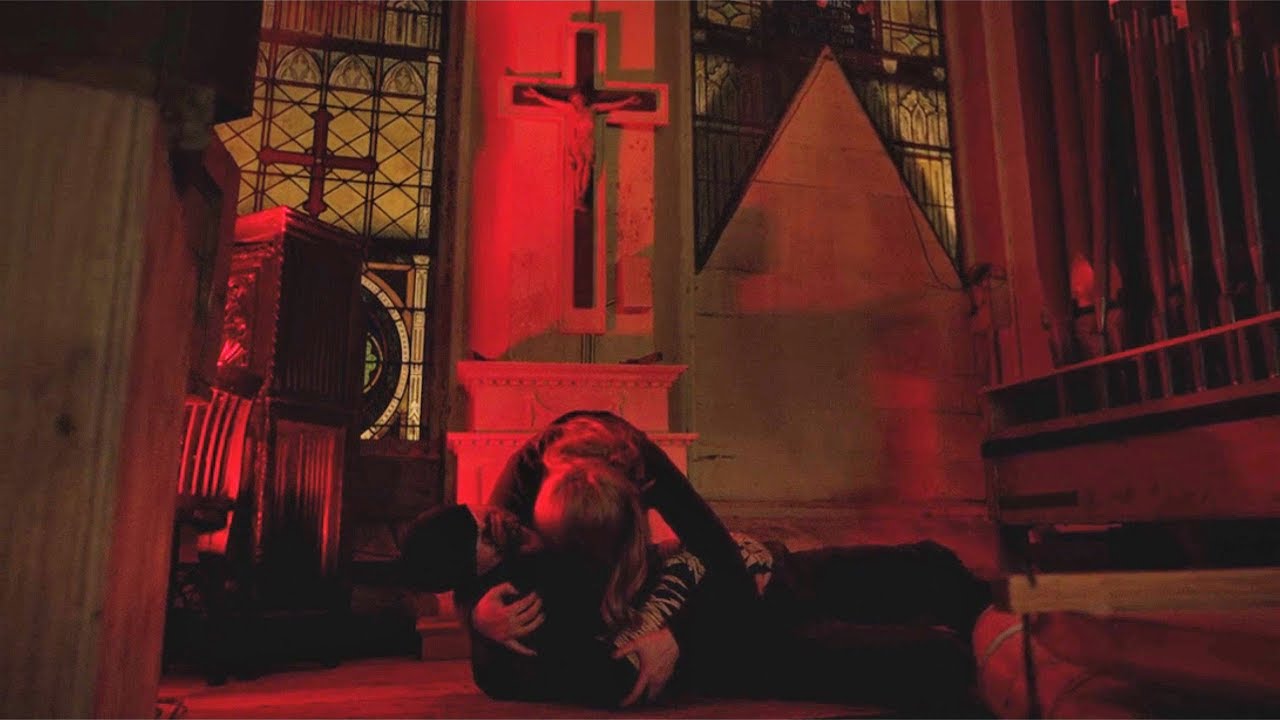
Daredevil Season Three acts as an incredible comparison to Marvel’s Avengers: Infinity War and Avengers: Endgame. Whereas both Marvel films includes a laundry list of powerful heroes battling for the fate of universe, Daredevil Season Three concerns itself with the intimate stakes of tightly knit group of characters. Unlike Marvel’s film heroes, many of which we know will return for planned and contracted sequels, Daredevil’s character don’t have to worry about that disappointing narrative handicap. With no future seasons (though a fourth season was planned out by the show runner before the show was cancelled), no character seemed to be guaranteed safety or survival.
The intimate drama of Daredevil Season Three excels by giving real, authentic consequences for each character’s actions. Each action taken by characters will have a meaningful effect on their lives and the relationships they cultivate. Karen’s decision to pursue and seek an interview with the criminal Jasper Evans sets in motion events that lead to the brutal massacre of the New York Bulletin and the hospitalization of her boss Mitchell Ellison, a surrogate father for her. Karen is left to confront the guilt and grief from her responsibility in the instigation of the massacre, a event made worse by its similarity to similar failures in her past. This emotional moment is an example of how authentic the consequences are for characters within the show. These characters are left to deal with the aftermath of their decisions, often confronting authentic and nuanced feelings of anger, grief, guilt, and pain.
While Spider Man’s death in Avengers: Infinity War is heartbreaking initially, seeing trailers for Spider Man: Far From Home, with a living, breathing Peter Parker, lessen the emotional impact. The death of Father Lantom in comparison, remains heartbreaking and unexpected death, long after the viewer finished the season. The character dies protecting Karen Page from Bullseye as he shelters people in his church. As Lantom dies in Karen’s arm, it is clear to audiences that there is no hope of resurrection or return for the priest. This moment illustrates that the choices these characters make have real palpable weigh, which creates a deeply emotional narrative. Lantom’s funeral, which is a key scene in the final episode, is an emotional rich moment that lingers long after the credits role.
Part VI – An Emotionally Rich Final Conflict and Ending
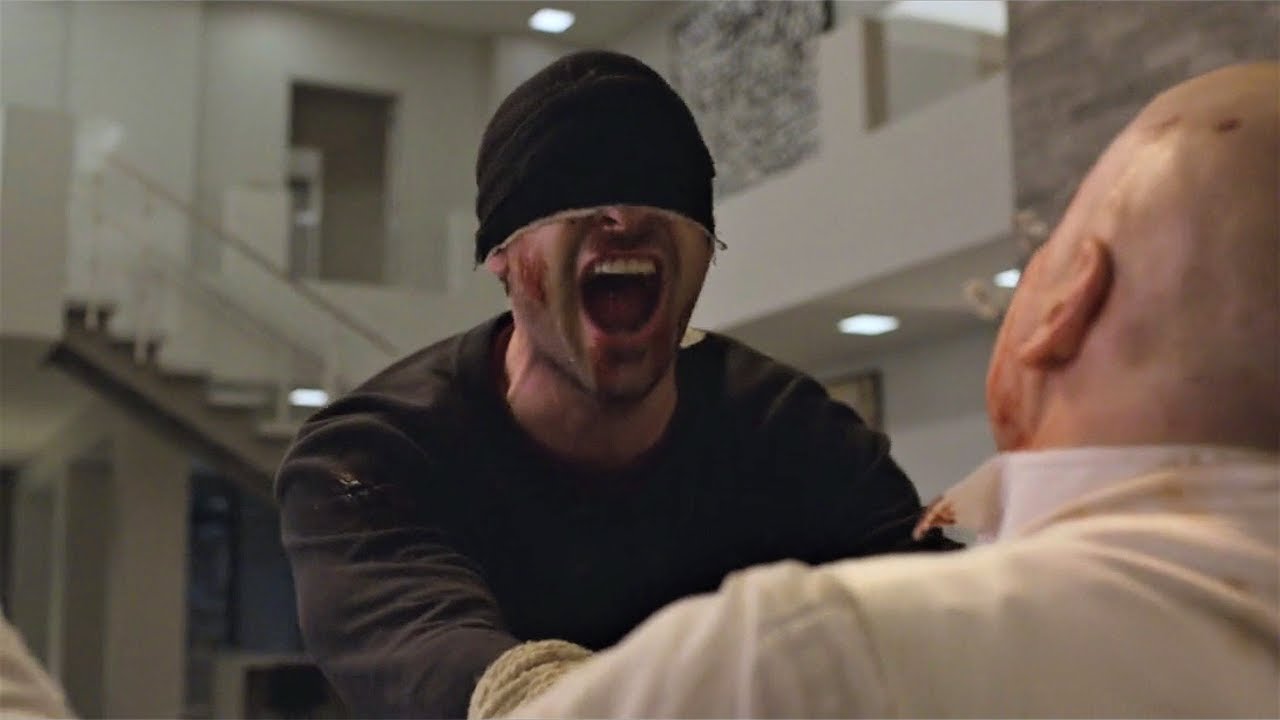
Daredevil‘s final episodes are paced to perfection. As the show progresses, there a sense of finality looming for Matt and Kingpin. The entire season has been a long, turbulent morality plan and this is its final brutal act. Matt’s first act is to undo the trust between Kingpin and Bullseye which leads to a three way confrontation between Kingpin, Bullseyes, and Matt Murdock. The show’s unparalleled fight choreography, previously demonstrated in Season Three’s New York Bulletin and Church fights, is used again to creates a tense final confrontation. Matt, who has come face to face with the terrible capabilities of a Daredevil without a moral code, defeats Vanessa from Bullseye before Kingpin cripples him permanently. With Bullseye out of the way, Matt confronts a bleeding and exhausted Kingpin. Matt brutally beats Kingpin, splashing blood across the iconic “Rabbit in a Snowstorm” painting, which was a key symbol of Kingpin in Season one.
With Kingpin staggering from the brutal beat down, Matt must finally make his choice: kill Kingpin or let him live. In this final moment, Kingpin pushes Matt to kill, asserting that he will never “stop hunting Karen Paige or Foggy Nelson” and threatening to reveal Matt’s identity to the world. Matt resists the temptation to kill Fisk and asserts that Kingpin does not “get to destroy who I am.” Ultimately only Matt can decide who is and what he believes. In an emotional speech, Matt asserts that Fisk go “back to prison, and you will live the rest of your miserable life in a cage knowing you’ll never have Vanessa, that this city rejected you, IT BEAT YOU! I BEAT YOU!”. Matt’s speech is incredibly power and demonstrates the rare instance of an unambiguous victory for the protagonist, with Matt trapping the antagonists with his knowledge of Vanessa’s role in Fisk’s crimes.
Throughout the season, Matt struggles with his own identity. The character has questioned the moral and ethical beliefs that he previous defined his life by. The supporting characters around him, including Foggy, Karen, Sister Maggie, and Kingpin, have all push Matt to clarify to his beliefs and resolve his emotional struggle. Through the internal and external struggles of Season Three, Matt makes definitve and unambiguous choice about who he is becoming. In his eulogy for Father Landam in the final episode, Matt discusses how the priest tried to show him how his fears and angers enslaved him and separated him “from the people that I[he] love”. In this emotional, closing moment, Matt acknowledges that with Father Lantom (and the rest of the characters)’s help, he has conquered the fears that “enslave” him and accepted the possibility of being “a man without fear”.
The Right Time To Say Goodbye
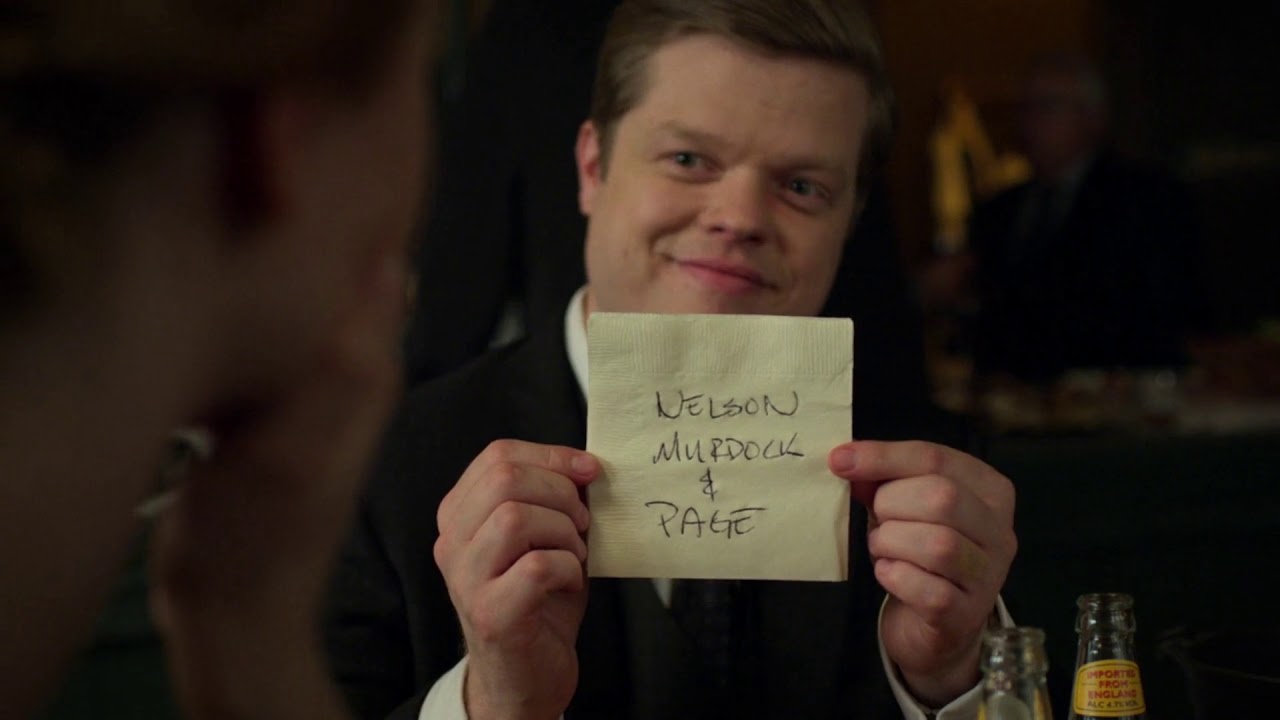
While its is clear from the Bullseye focused post credit scene that end of Season Three that the show runners had plans for a fourth season, Daredevil was ultimately cancelled. While there are many factors, majors factors include the cost of the show, decline in viewerships across all Marvel Netlfix shows, and Netlfix’s tenuous relationship with Disney and Marvel Studios. The choice to cancel the show was especially disappointing as many fans and critics viewed Season 3 as the best season of the show, possibly the best season across all of Netflix’s Marvel shows.
While there were for some plans for a fourth seasons, from a narrative standpoint it makes for the show to conclude with Season Three. With season 3, the show deconstructed and rebuild its hero. The show always focused on Matt’s internal struggles and the events of Season Three required Matt to put many of those demons to rest. Additionally, the show challenged and ultimately reconfirmed the intimate and powerful friendship between Matt, Foggie, and Karen, leading to the emergence of Nelson, Murdock, and Paige (or Paige, Murdock and Nelson). Likewise, the battle between Matt and Wilson Fisk is concluded in a seemingly resolute way, with Fisk serving his sentence in order to protect his wife. The threat of Wilson Fisk was a key aspect of the show that both the protagonist and antagonist used to define themselves by.
With the ultimate antagonist defeated and narrative threads tied off, it is fitting that Season Three would be the last for Daredevil. It is hard to believe that any future seasons could match the emotional nuance and impact of the show’s incredible third seasons. While other show peter out and run out of gas, Daredevil raced to the finish line, leaving audiences with one of the best seasons of television as its final gift to audiences across the world.
What do you think? Leave a comment.
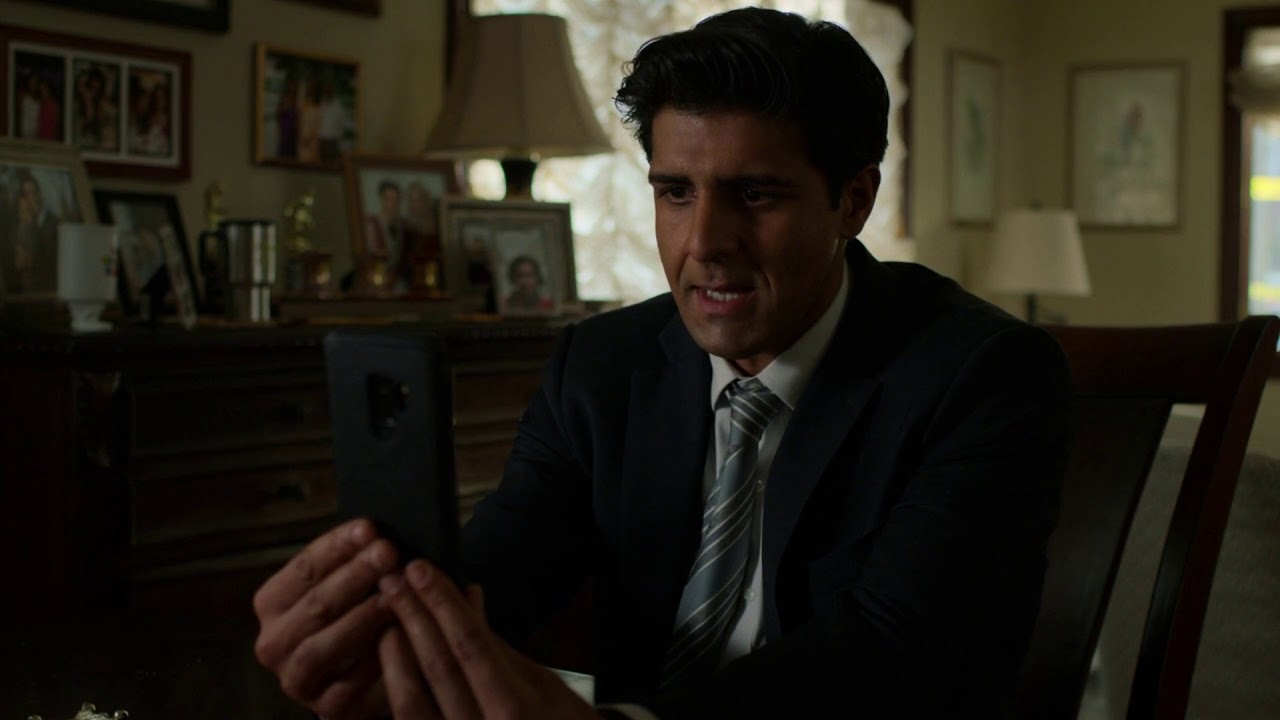











Profound analysis. It’s worth seeing all seasons just to get to the I BEAT YOU moment.
Amazing season, amazing series, I’ve recommended this to so many friends, who are huge Marvel nuts, but they all say “Doesn’t seem interesting enough”, ….we are no longer friends.
This season has gone back to its season one roots. As grounded as a comic book show can be but still based on its roots. The idea that a superhero could be blind and still be a ninja absolutely blows my mind (I’m a poet and didn’t know it). I know Marvel has cancelled the Netflix shows but you need to continue Charlie Cox as Matt Murdock/ Daredevil or else I will lose my mind! He’s absolutely perfect in these roles!
Best superhero series ever. I wonder if they can make a spiderman like this. I really want that Spiderman – Daredevil apprentice – mentor relationship! Spidersense vs radarsense
That final episode was some of the best of television I’ve seen since Breaking Bad and Game of Thrones….
I gotta say that Charlie Cox is one of the most talented actors out there. Already the cast is solid with almost every character bringing a top notch performance but he brought it to a next level. When I watch interviews with him it’s almost like Matt is pretending not to be blind just because of the subtlety and attention to detail he has and it genuinely seems as if he can’t see anything. Other than that, he also manages to portray a lawyer (and a damn good one) as well as a ninja while doing a good deal of stunts himself and talking with an American accent (He’s British too if you didn’t know) that is indistinguishable with the real thing. When I watch interviews with him it’s almost like it’s Matt pretending to be Charlie instead of the other way around.
1-Daredevil S2
2-daredevil S1
3-Jessica Jones S1
4-punisher S1
I hated the rest even dd s3.
That 10 minute fight scene in episode four was the best in the entire series.
I had a great time watching and experiencing this 3rd superb season. Daredevil season 3 was absolutely fantastic, but I feel everyone is jumping on the DD s3 exciting train ride and praising it like it’s perfectly a masterpiece. I loved most of the eps, but I was tired of some of the plot lines by ep 9-12. Sister maggie and some things with the FBI and special agent Dex/fake daredevil, got on my nerves in some scenes. There were things that made little sense. Loved the last episode so much though.
For me, the first two seasons of Daredevil and Jessica Jones 1st season, are still my favorite. DD S3 comes after. I would say I liked DD season 3 more than the Punisher season. I think what makes this show so strong, are the brilliant cast. Charlie Cox IS Matt Murdock, FOREVER. Vincent Donofrio is just incredible again, as Wilson Fisk. Karen Page and Foggy are both the best they have been as their characters, since DD 1st season. Deborah Ann Woll is such an underrated actress. She carried her guilt and how tormented she was with such grace. Finding out about her past and what happened witht he accident, you see how she grew. Her scene with Fisk was amazing. Loved their chemistry.
I think agent Nadeem is the breakout character of the season. I liked him way more than Dex aka fake daredevil (bullseye). Sister maggie did a great job but I hated how she revealed herself as matt’s mother. that was kind of meh. My biggest regret: No Elektra. I would have LOVED to see elektra again in this season. That was a loss, for me. Elektra could have been used in the last 3 episodes.
I thought it was alright. I really enjoyed season 2 way more, I thought season 1 was better than 3 even. But all in all, it’s not bad. Still leagues ahead of the other Marvel Netflix shows.
Just finished watching s3 . All the points you mentioned in your analysis I totally agree.
I loved season 3. A good plot needs a good villain(s) and some good origin stories. Fisk shows his unconditional love for vanessa and in his eyes he does what he think is best. Woooow and bullseye was just plain badass man. Loved the scene where he just pops everyone in front of fisk and throwing knives, leaving fisk wondering and at that moment he knows he shouldn’t mess with pointdexter. Also very understandable storyline for matt and wanting to kill fisk because he doesn’t believe in the law anymore. Fight scenes at it’s best!
The only gripe I have with season 3 is Karen. She’s always been the one character that just gets on my nerves, sure she has some balls when she talks to kingpin and the media but she’s such a bumbling mess all the time she spends most of her time crying and being a burden almost.
She gets at least 2 people killed each season and then cries about it, and then does the same rash, impulsive decisions.
I binged the last 7 hours of it last night. It’s f*cking fantastic! The same happened with season 2, but the plot in that season fell apart the second you even slightly thought about it. Here it made perfect sense, and oh boiiiii what a ride. It did feel a tad repetitive in some elements, but made up for it in spades in other areas. That tracking shot in the prison was just unbelievable. D’onofrio is better than he’s ever been. Bullseye is just terrifying. In certain scenes I caught myself tensing up and going “Yeah!” without even realizing it. One scene in particular reminded me of the end of God of War 3 where you just incessantly beat Zeus into a pulp. And last but not least, that Karen episode was genuinely hard to watch. Made me feel almost nauseous. Best season of any Marvel show thus far, period.
My Daredevil season ranking:
* DD 1
* DD 3
* DD 2
Do I need to watch the other Netflix Marvel Shows to understand this one??? Because I dont really care for them. Im just a Daredevil fan. Nothing else.
If you watch all seasons of Daredevil and just look up some spoilers/background for Matt in Defenders you should be fine! It stands by itself pretty well.
You should watch The Defenders between season two and three, where they all team-up, but not any of the individual shows, you don’t really have to.
Why doesn’t Marvel cross over the movies with the Netflix shows? I appreciate the references n all but they’ve done a superb job with the character development in Daredevil season 1-3 that you can’t help but want that. I’m a little late catching up on season 3 (I got my reasons) but it totally surpassed my expectations. Out of all the Marvel series on Netflix, Daredevil is hands down my favorite. Punisher 2nd, Defenders 3rd. The others I personally feel were kinda “meh” overall but I still appreciate em.
Great season. Shame netflix cancelled it.
I hope Daredevil after this Marvel/Netflix crab back into the fold of the MCU in a future spiderman movie where they do a movie version of the Daredevil team up episodes of the Spiderman tas episodes where Peter Parker is framed and Spiderman and Daredevil team up to take down the Kingpin and the Chameleon.
The 90s Spiderman was my first introduction to Daredevil as a kid!
The writing of season 3 is just masterful.
I had to really restrain myself not to blow the whole season in a weekend because of how good it was. Stretched it to watching it all within a month, but damn was it a suspenseful and awesome ride.
I really did love this season and all of the characters. The story was brilliant and the last episode had me on the edge of my seat however.. I will say that Daredevil along with most of the Netflix Marvel series do full victim to some inconsistent acting and some poor fight sequences. Yes the 11.5 minute fight scene was amazing however I still cannot forgive some of the obvious punches that hit clean air but send a person flying, not to mention some other WWE equivalent choreography. An another example of poor acting would be from the prison inmate half way through the single shot scene. To sum up, the show can be very inconsistent for me however the good outshines the bad.
I loved this season, way more than the first, but I didn’t like the resolution and I didn’t like that we didn’t get Bullseye proper. I mean, they call Fisk Kingpin but no one mentions “Bullseye” or have Dex say “Bullseye”? 😞
In Season 2 I loved the Punisher story, but didn’t care for the Elektra story. In Season 3 I loved Bullseye, Karen, and Nadeem, but didn’t care for “the long lost parent” story that crops up everywhere (including Jessica Jones season 2, ruining what was my favorite Netflix show), or the Fisk part of the story.
Karen was the most annoying character by far she brings 0 to the show and all she does is come up with horrible ideas and get people killed for her mistakes.
i wasnt excited for this Daredevil season because there didn’t seem anything new BUT man, i couldnt stop watching after first episode. Yep, I binged. 😡 It did feel slow a little in the beginning but it wasn’t a drag, it needed to be a little slow to build up. I loved this series. It didn’t disappoint.
Anytime I see Matt Murdock or daredevil walking through a hallway I assume a masterful ass kicking scene is coming.
I am up to episode 10 now. and can honestly say that was the first decent episode. So slow, so sluggish and some fighting scenes where very disappointing.
best serial
One of the best shows my eyes have laid on.
I loved Daredevil for the female characters. Electra, without a doubt my fave! https://www.youtube.com/watch?v=Y6udNndwXEw
Karen a close second.
https://www.youtube.com/watch?v=r9QvtdfVzUM
This series literally blows all the other marvel ones out the water.
We need an Electra and Karen spinoff.
Just make sure it doesn’t end up like the movie.
Points very well-made. Daredevil is a masterpiece among the Netflix’ Marvel series and a gem within the whole MCU. I also don’t mind that Season 3 was the show’s last because they’ve gone full circle of Matt’s identity as himself and as Daredevil from the first season. It’s a good place to end.
Insightful. I have watched the first two seasons only but your article means that I will definitely check out the third season whenever I get some time. On a side note, I also believe that Daredevil: Director’s Cut(2003) was quite good. Too bad, they released the movie the way they did.
I absolutely agree that the Daredevil Director’s Cut is far superior to the original release.
The added law subplot and the exceptional final monologue are two massive improvements on the original version of the film, along with a generally more serious tone. There are some aesthetic similarities in certain locations in both the film and season 3 of daredevil, as you will see if you watch it.
A perfect analysis of Daredevil.
Daredevil was the only Netflix made Marvel show that I loved through and through. Punisher lost most of its viewers after season one, and Jessica Jones was a mixed bag once season two began. However, I will say the final season of Jessica Jones had some good components. I’d love to see another article like this, or even write one about Jessica Jones.
This article is absolutely spot-on.
As for the final episode, and with Bullseye, I personally believe the show was concluded perfectly. Something all superhero/comic fanatics know is that the “fight” never ends. There’s always going to be something and someone else to face. While the show runners had some sort of plan for a fourth season, I’m happy it ended the way it did. Dex’s character development reminded me of why villains- and their stories– are just as important, demanding careful thought for the perfect execution.
Additionally, thank you, Sean Gadus, for taking the time to write this. Your article is eloquent, thorough, and overall- stunning.
Thank you for the kind words, it is always good to know someone appreciates what I have written.
I am curious, and if I may ask, what did you think of the other Marvel shows that Netflix made?
I really enjoyed the first seasons of both Luke Cage and Jessica Jones. I thought David Tenant’s performance in Jessica Jones was particularly memorable. Overall, I felt like those 2 shows started strong but did not sustain their excellence as long as Daredevil. Unfortunately, I did not watch either Punisher or Iron Fist beyond a few episodes, though I did enjoy Jon Bernthal performances as Punisher. I’d be interested in hearing your option on the Marvel Netflix shows as a whole.
As a whole, there’s so much to say. That being said, I haven’t seen all of them, and like you, I did not watch them through and through. Season one of Punisher was good, but the other two seasons were more of the same. I agree that the shows, Daredevil aside, did not maintain the strength of their beginnings/first seasons. Also, quite a few close friends and relatives have all reported that Punisher and Luke Cage both had decent first seasons, but were poorly executed. With that, they recommended I end at season one of those. I wanted to keep with Punisher since I do like him, especially in the comics, but again, I’m not sure it was worth it. I have yet to watch Iron Fist and Luke Cage. Again, Jessica Jones, was pretty well done compared to the rest. Daredevil still being far better executed. I’ve been wanting to watch The Defenders since season one of Jessica Jones, but I have a hard time going into it without watching Luke Cage and Iron Fist first.
Maybe that’s a silly approach, but it’s just how I justify it, I suppose.
This article highlights all the narrative elements that make Daredevil a masterpiece, but I don’t think they ever achieved a better season than the first. The third season didn’t quite have that rare balance of action and drama we saw in the first. Even though the writers delivered with Matt’s struggle with morality, I felt that the reveal of his identity to Fisk was anticlimactic. That being said, the one-take prison fight scene was incredibly impressive and suspenseful, probably the best episode to come out of the season. The final scene showed that Dex, already unhinged and dangerous, could have a newfound sense of invulnerability along with nothing to lose. Which sets him up as a pretty interesting villain, more of a “man without fear” than Murdock himself.